- Home
- M. K. Hume
The Storm Lord Page 3
The Storm Lord Read online
Page 3
In a short space of time, the ship was made watertight and dry once more. Everyone and everything was sodden, but the gods of chaos would search in vain for the souls of these doughty seamen. The she-dragon must look elsewhere for bones for her ossuary on this particular day.
Freed once again to make use of the churning breezes that blew in the wake of the storm, the ship resumed its original course, a feat which only Stormbringer appeared to understand. On several occasions, he consulted an odd, circular piece of metal with strange runes carved into it, but Arthur had no idea what purpose the object served. The young Briton smiled ruefully. The Dene could do something that even the Romans had never mastered: they could sail beyond the sight of land.
Arthur dragged himself to his feet. Climbing over bladders of water, sodden rags of clothing, wooden boxes, and other flotsam that lay in no more than a finger joint of freezing water over the decking, he inched his way to the base of the mast and pulled a bundle of hides and wool away to reveal Blaise and Maeve huddled together with their arms around each other. A line of blood snaked out of Maeve’s hairline where some flying object had struck her, but his sister was otherwise unhurt. Luckily, Blaise had suffered no harm either.
With unspoken thanks to God, Arthur slumped into his usual position against the mast and leaned back with a sigh.
“We’re still alive,” Blaise murmured, then laughed shakily as she pulled the bowl holding the remains of the seafood stew out from the mess of blankets. An inch of viscous weed and vegetables still clung to the edges of the container. “Look, I’ve saved my supper,” she chortled with a trace of hysteria. “Master Stormbringer was wrong. We’ll have something to eat after all.”
• • •
THE CAPTIVES FELL asleep with the ease of young animals, but a strange sound woke Arthur with a rush.
A smiling Stormbringer stood above him. “At last!” the commander said. “I thought you and your friends planned to sleep all the way into harbor.”
“What’s that?” Arthur asked. The faint light around them seemed to suggest that night was falling, although common sense told him that the hour could scarcely be past midafternoon. Arthur’s thoughts were scrambled, but his ears had been charmed to wakefulness by the mournful song of one of the warriors who was coiling a long piece of flaxen rope. As he sang, his shoulder and arm muscles flexed and relaxed in turn to the repetitive pattern of his labor.
“Ranalf sings of the birth of the Dene people and the long and perilous journey of the Scyldings to our first home,” Stormbringer told him. He sat at his ease on the half deck that raised the helmsman up in order to control the great tiller. Even with extraordinarily long legs, clad in trews of leather for warmth and laced along the outside, Stormbringer was forced to swing them like a child on an overlarge stool because the half deck was very high. Arthur had difficulty concealing a smirk of amusement.
“Who are these Scyldings? I presume we’re to be taken to your king, who’ll determine our fates. I’m inclined to think that slavery will be the most likely outcome, so I’m anxious to know as much as possible about our future masters. I understand the fates of captives, although I’m upset that my sister and Blaise have been captured with me. If mercy can be granted to outlanders in our position, I’ll happily beg for consideration for both of these young girls. They’ve done nothing to hurt anyone, so why should their lives be laid waste?”
Stormbringer shrugged with his usual enigmatic lack of expression, but Arthur thought he saw a shadow of regret pass through the Dene’s startling blue eyes. Then it was gone.
“My lord, Hrolf Kraki, who is also known as the Crow King, is the king and my master. He alone will decide your fate and the separate destinies of your friends. Although I’ll explain to my king that you were betrayed by a fellow Briton called Mareddyd, I will have no part in his decision. I might add that I refused to accept any coin from Mareddyd for his treachery because I considered that you might be of use to me if I were to take you to the Dene lands. In fact, Arthur Dragonsen, I gave three rings of pure silver to Mareddyd to have you lured into our ambush.”
Arthur shook his head, too angry to speak aloud of his frustration that Eamonn, Maeve, and Blaise should suffer because of his feud with the traitorous prince of the Dobunni tribe.
“I will tell my king how well you assisted my warriors during the storm, so my lord may decide to be generous. He can be extremely fair when the mood takes him.”
Stormbringer paused as he considered his next words.
“In days gone by, the throne of Hrolf Kraki’s father, Halga, was stolen by Snaer Frodhi, the son of Frosti, who used trickery to usurp Halga’s crown. Snaer ruled our people in cruelty and oppression for the next fifteen years. During that time, many good Dene lords were forced to wander the earth else Snaer would have them murdered. Hrolf Kraki was one of these, banished after the assassination of his elder brothers. Ultimately, my master regained the throne and I returned from the Frankish lands where I had fled with my warriors. I know what it is to be a stranger in a foreign land who must prove himself with only the strength of his arms and the purity of his heart. Now, my king hates traitors, and he might show mercy towards you, though only Loki or Jesus Christ can tell how he will respond to your pleas.”
“Any assistance you can provide to your king that will protect my companions will place me in your debt, Master Stormbringer.” Arthur rose to his feet and bowed his head to the Dene leader. In this obeisance the Briton lost no dignity, for Stormbringer judged correctly that Arthur asked for nothing for himself. He nodded to the younger man and extended his own sword hand in friendship.
“We’re men, aren’t we? I’ve been told by your friends that the British people call you the Last Dragon, and they believe you are the son and grandson of the ruler from the Red Dracos. Is that true? If so, I deem you to be a lucky man who’s been blessed by the god of Father Stephan, for a sensible man hedges his wagers when it comes to recognition from the lords of Heaven. I’ll help you all I can as long as you don’t ask me to betray my own kin or my people, Arthur Dragonsen, for I have a feeling that you’ll be a greater asset to our king as a warrior than as a slave.”
Stormbringer inclined his head in a gesture of respect as Arthur hastened to thank him.
“You asked about the Scyldings? Listen, Arthur Dragonsen, and I will tell you an ancient tale that will explain much about my people. Then you might understand what it means to be a Dene.”
And so Stormbringer told Arthur a story of Opland, the Dene’s ancient homeland in the frozen wastes of the north, a place of mountains so high and bare that snow crowned their heads all year round like a cap of white hair; a place where strange lights blazed across the night sky like a gift from the gods of Asgaad; and huge deer came briefly in vast herds. The winter was long in these lands, so the ground was permanently frozen and no plow could break its crust of ice without a superhuman effort by those poor humans who dwelt there.
“In this land of deep fjords and long nights, where the sun is mostly a memory, the Dene people starved and suffered in silence, although they were good fishermen and clever farmers. In Opland, death stalked the people throughout the winter months if the harvests failed. My great-grandfather once told me of how children were forced to eat grass and leaves to still the agonies of hunger during times of famine. Despairing, the people decided to challenge the way that life and death afflicted them. They fought back against the will of Heaven.”
Shocked by the tale of children forced to eat grass, Arthur rejected it. Instead, he tried to picture a sky filled with many-colored lights that flowed through the dark, velvet night in rivers of incredible beauty. The young man had never heard of this river of light. But Stormbringer swore he had seen its magic, and Arthur was certain that Stormbringer never lied.
While the Dene leader spoke, several warriors paused in their assigned duties and hunkered down on the deck to listen to hi
s tales with rapt attention. Not only was Stormbringer a gifted storyteller, but he used words and gesture to bring the ancient sagas to life. Arthur too became ensnared in Stormbringer’s net of words and images, and was dragged into the world of the Dene.
“Eventually, a man called Skiold was born and grew to manhood in the tribe. Under his guidance, the first of the Dene people made their trek across treacherous rivers and glaciers of ice until they reached a softer land that was bounded on one side by the sea. Here, beyond the coastal dunes, the land was rich, flat, and aching for the plow.
“In this land, fish seemed to leap into the coracles that those first Dene built, while cows stood belly-deep in green grass. The rivers were gentle and broad, and a great lake fed them with sweet water that flowed down from the mountains. The farther south they traveled, the more blessed and hospitable were the lands that they took as their own.
“Sadly, the lands they settled were part of Västergötland, whose king opposed the Dene invasion of his fiefdom. When his army came to kill the Scyldings who ventured onto his soil, Skiold led his desperate followers in a great massacre of the defenders. It was a time when brave men stood awash in blood and counted this land as a good reason to give up their lives, if their families could free themselves from the terrors of starvation.
“Vast rewards were won on that day of blood and courage, and when victory finally came, many songs were sung of the feats of Skiold’s warriors, so those who survived were, forever after, proud to be called one of the Scyldings.”
Stormbringer paused for breath and a warrior pressed a freshwater bladder into his hands. The captain drank deeply before resuming his story.
“Many were the battles between the two tribes, but the Dene triumphed and held the coastal lands in their clenched fists. They set down their houses, built of flint, stone, and timber, which they found in abundance along the low hills. Skiold built his hall both tall and strong, and filled it with rich carvings that told the story of his exploits. These wooden panels were set into the lintels, so the Dene children would never forget the sacrifices made by the glorious dead for their safety.
“And so, the Scyldings came into being, and Skiold’s hall flouted the might of Västergötland when our leader took the name of King of Reidgotaland so many years ago. His son, the first Frodi, followed Skiold and extended the lands of the Dene into the south. In Skania, Frodi called on his people to master the seas, so the Dene put aside their coracles and turned to those men who could sing the trees.”
Arthur had never heard of tree singers, although trees had always been sacred to his people. Stormbringer explained. “Those of you who have grown to manhood in the halls of the Dene know that some women are gifted with the Sight and can sing the sea to gentleness. It’s a pity we have no seawife with us on this voyage, but I am deemed to be Christian and few of the sighted ones choose to travel under the sail of the Christian God.”
“But your sail bears a red dragon,” Arthur said, with a quick glance to where the wool billowed in the wind.
“Aye, but I’m not just a Christian, you see. No Dene would ignore the dragons of ice or the serpents of Mother Sea. I’m a Dene, but I’m not a fool! A sensible man treads both paths.”
“I understand,” Arthur said. “But I still don’t comprehend tree singing.”
Stormbringer donned his storytelling face again; his voice deepened and became more authoritative.
“A man called Ragnarsen lived in Opland with many of those people who would become Dene. He had a talent. It was a strange, wild gift that allowed him to read and understand the secrets hidden within a tree. When a jarl needed a large beam that could hold a roof high above the chief’s head, Ragnarsen would stare fixedly at a tree as if he could see through bark and foliage to its heart. He was rarely wrong, and the trees gave up their hidden selves to his needs.
“Ragnarsen would beg the tree’s forgiveness before he took his axe to its trunk, while he always promised that its timber would never be wasted. Every tree that Ragnarsen and his sons took from the forest was replaced by a number of seedlings, planted in open areas, while every part of the tree that was harvested was used for one purpose or another. Ragnarsen had always stood tall in the eyes of his tribe, for he gave succor to every family in his village. But even Ragnarsen suffered in the tree-poor hills of Opland and starvation had laid waste his family.
“And so, as a valuable member of the tribe, Ragnarsen traveled with the first Scyldings to a new home in the broad flatlands of the south.
“When Frodi, the son of Skiold, looked towards the islands that lay so close to the shore of his new realm, he understood that ships to carry his warriors into new lands would soon become necessary. And so Magnis Ragnarsen, the son of the first tree singer, was set to work on the great labor of building a ship. No Dene had ever needed seagoing vessels in past times, for Opland had been landlocked.
“Magnis Ragnarsen sat and thought for a very long time. Fridlief, who succeeded Frodi, grew impatient to see his father’s dreams come into being, but Ragnarsen would not be hurried. Eventually, the first Dene to become a shipbuilder took his axe to a tall tree and used its one-sided blade to shape a long keel.
“Fridlief had heard that work had begun on the ship, so he traveled to the Ragnarsen home on a sunny morning in spring. The virginal forests of Västergötland began a stone’s throw from Ragnarsen’s simple croft. The place where he was to build his ship had a roof put over it, and wooden walls were raised around it, because Ragnarsen built his workshop while the ship was under construction.
“What King Fridlief saw in that wooden structure became the stuff of legends, for he beheld a skeleton with great curved ribs rearing up as if to strike at the sky. Fridlief saw immediately that this rudimentary vessel demanded a tall figurehead on its prow, for he could recognize in it the bones of an ice dragon. And so Ragnarsen promised to construct the head and wings of the magic beast that would carry his king across the waters in future conquests.
“When the king asked for the drawings of his ship, Ragnarsen smiled and shook his head. He explained that the plans lived within his head and there they would remain until the craft was completed. Even today, generations later, Ragnarsen’s family are still our people’s greatest shipwrights. No drawings were used to build our vessel, which has just survived the full force of the sea’s fury. The drawings live on in the minds of those men who sing the trees.”
Arthur nodded his understanding and smiled. Even Stormbringer, accustomed as he was to praise for his storytelling skills, was gratified by the young man’s appreciation.
“In the reigns of Havar, Frodi the Second, and Vermund the Sage, trade began between the Dene and their neighbors, the Jutes and the people of Angeln. Within a century, the people of Skania grew rich and their influence spread inexorably into the islands close to the Sound. Sjaelland and Fyn, the largest islands, absorbed some of the Dene people, but most of the emigration was to Jutland, part of the mainland which the Romans called the Cimbric Peninsula. Many years of trade and migration by those Dene citizens followed, but the day inevitably came when the great king, Dan Mikillati the Magnificent, founded the Dene Mark by sending warriors to secure remote outposts in Jutland. Long was the rejoicing in Dan’s Hall in the south, but the Jutes resisted the annexation.
“The kings of the Scyldings gradually became the masters of the islands, large and small, and the tribal lands of Jutland and the Angeln became Dene. Pitched battles were fought, and the Sae Dene came into existence to rove ever farther at the bidding of their own kings who answered to the overlord of the Dene Mark. King Hnaef, who was the master of the mercenaries Hengist and Horsa, was one such sea king. I’m sure you have heard of Hengist, Arthur Dragonsen, for it was he who became the first Saxon thane to carve a kingdom from the soil of your homeland. Yes, Arthur Dragonsen, the histories of the Dene and the Britons are intertwined like the tails of the ice dragons that rule the
northern seas and skies.”
Arthur’s face stiffened. Taliesin had told him the tale of how Hengist saved the child Myrddion Emrys from the malice of Vortigern, High King of the Britons. He recalled that Vortigern had also waged war against Arthur’s grandfather, Uther Pendragon, and his brother, Ambrosius Imperator.
“The skeins of our histories are indeed tangled together, Master Stormbringer.” Arthur shook his head in perplexity and, out of long habit, his hand moved to stroke his lost knife. Although Stormbringer noticed his captive’s confusion, he continued with the ending of his long tale.
“When Ranalf was singing, he mourned the death of the hero Beowulf. King Hrothgar Scylding, in his hall at Heorot, had called for the hero’s assistance. The Dene people mourned the passing of the man who slew the traitorous Grendel and his kin for many years. But those who bear arms must risk a violent death. And so it was that Beowulf, the Geat, perished in battle against the mercenaries of the Angeln. I was a small child when Beowulf came to Hrothgar Scylding’s hall, but I still remember the boom of his voice and the curling red beard that fanned out over his chest. I’m not surprised the harpists of the British Saxons are already singing his praises.
“The Scylding still rule the Dene and the Sae Dene. Now, with praises to Jesus and Odin, Hrolf Kraki rules, having sent that bastard Snaer to the depths of Udgaad, where I hope he will trouble no other decent-living Dene. So the Scylding kings have won our country by right of conquest.”
Gradually at first, Arthur began to laugh, his laughter becoming harsher and very bitter.
“What is it that amuses you?” Stormbringer asked.
“Can’t you see what the Dene have done, Stormbringer? Your people have inadvertently caused the destruction of the British homeland. The Dene drove the Jutes and Angles out of the Cimbric Peninsula, and they moved southward. Like Hengist, they then crossed the Litus Saxonicus to Britain. The Angles displaced the Saxons, the Frisians, and the northern Franks. Then, as we know to our cost, the Saxons and the Angles have flooded into Britain in such numbers that our homeland is now called Angle Land.

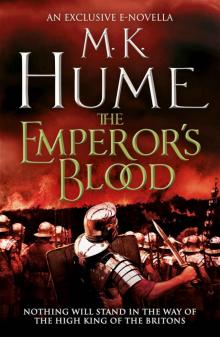 The Emperor's Blood (e-novella)
The Emperor's Blood (e-novella)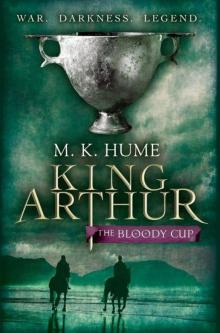 King Arthur: The Bloody Cup: Book Three
King Arthur: The Bloody Cup: Book Three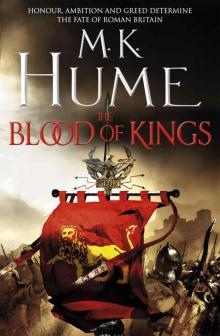 The Blood of Kings: Tintagel Book I
The Blood of Kings: Tintagel Book I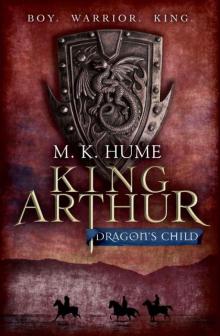 King Arthur: Dragon's Child: Book One (King Arthur Trilogy 1)
King Arthur: Dragon's Child: Book One (King Arthur Trilogy 1)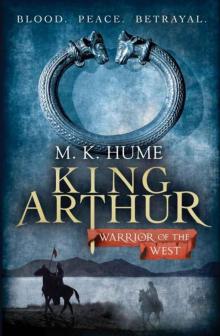 King Arthur: Warrior of the West: Book Two
King Arthur: Warrior of the West: Book Two The Storm Lord
The Storm Lord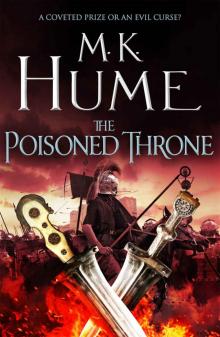 The Poisoned Throne: Tintagel Book II
The Poisoned Throne: Tintagel Book II![M. K. Hume [King Arthur Trilogy 04] The Last Dragon Read online](http://i1.bookreadfree.com/i2/04/07/m_k_hume_king_arthur_trilogy_04_the_last_dragon_preview.jpg) M. K. Hume [King Arthur Trilogy 04] The Last Dragon
M. K. Hume [King Arthur Trilogy 04] The Last Dragon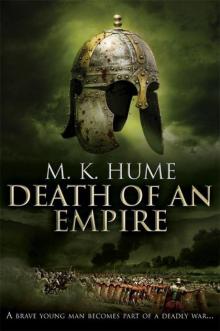 Prophecy: Death of an Empire: Book Two (Prophecy Trilogy)
Prophecy: Death of an Empire: Book Two (Prophecy Trilogy)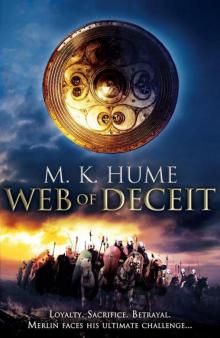 Prophecy: Web of Deceit (Prophecy 3)
Prophecy: Web of Deceit (Prophecy 3)